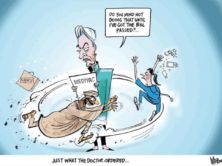
The BBC aired a “false statistic” about literacy rates in Scotland.
The mistake happened in a Sunday Politics program back in 2017 before the the UK general election. Host Andrew Neil claimed that “one in five Scots pupils leave primary school functionally illiterate.”
After a viewer complained, the BBC said its source for the report was a 2009 study. When questioned by the complainant, the BBC later said the statistic was taken from a 2014 study published by the Scottish government, and finally later in the investigation, the BBC said it was from the 2009 study, after all. The BBC’s internal investigation ruled that the report was inaccurate and the source wasn’t the most current information.
OfCom, the UK broadcast regulator, examined the matter, and rejected the BBC’s argument that because Sunday Politics was not a news program, the information was not required to be accurate. The BBC defended its report saying that Alex Salmond, the Scottish politician and former First Minister of Scotland, who was a guest on the program when the mistake was made, didn’t challenge the claim.
iMediaEthics wrote to the BBC to ask if it has taken any steps in response to the OfCom ruling. A BBC spokesperson said: “The BBC has already upheld a complaint on this issue in 2017 and we will study Ofcom’s findings.”
The host, Andrew Neil, defended his comments and told OfCom “it would have been better if I had phrased my question along the lines of ‘why is literacy among Scottish school pupils still so bad — and maybe even getting worse.’ But I do not accept that the formulation I used seriously misled viewers about the gravity of the situation.”
OfCom questioned why the BBC didn’t issue a correction at the time of the report given it received a complaint and it was during an election time. The BBC argued it was because its internal investigation took longer than expected and a shortage of staff.
For OfCom’s part, OfCom found that the BBC wasn’t able to show “a proper basis for the statistic used” and the BBC and its host admitted it was an inaccurate statement. Because the question referred to “a specific time…and the repeated use of the statistic ‘one in five’ and of the term ‘functionally illiterate,'” OfCom ruled that readers were misled into thinking there was an actual statistic or source for the claim.
The BBC claimed it wasn’t “materially misleading,” but OfCom concluded “this content materially misled viewers so as to cause potential harm or offence.”
OfCom also flagged that the BBC gave differing answers when first contacted seeking the source of the claim, the “length of time it took the BBC to admit there was no factual support” as “deeply unsatisfactory,” as well as the time it took to correct.
“We expect better standards from the BBC, both in its handling of viewer complaints and in its interaction with OfCom,” OfCom ruled.




